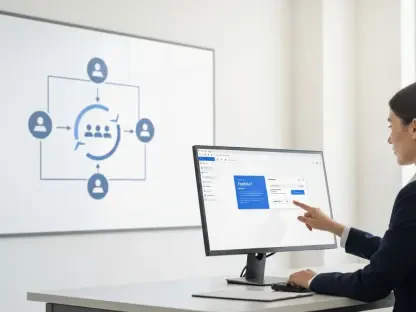For software development companies, finding the right talent is akin to searching for a needle in a haystack. Experts like Anand Naidu, known for his deep insights into coding languages, stress the intricacies of hiring developers who can not only code effectively but also communicate well and adapt to constant changes in technology. Naidu sheds light on the evolution of coding interviews and discusses why traditional methods often fall short, suggesting modern approaches that may lead to better hiring outcomes.
Why do companies find it challenging to hire good software developers?
Hiring developers involves uncovering their true capabilities amidst a sea of applicants. Companies not only need to determine if candidates can write quality code and master specific programming languages, but they also have to assess their communication skills and ability to keep up with continual tech evolution. All this requires more than just interviews; it demands a meticulous evaluation of the candidate’s all-round abilities, making it incredibly challenging.
What are the high stakes involved in making a hiring mistake in terms of developers?
A hiring mistake can be quite costly, both financially and in terms of productivity. If a developer fails to deliver quality code, it can undermine project timelines and end goals, leading to wasted resources and effort. Moreover, correcting these mistakes can take considerable time, further straining the company’s operations and reputation.
What was the initial method used by companies to assess candidates’ coding skills during interviews?
The initial method was utilizing whiteboard coding interviews, where candidates solved puzzles like reversing a linked list or conducting a binary search in real-time. This approach aimed to evaluate the candidate’s ability to think on their feet and solve problems in a pressuring environment, which was considered valuable by many tech firms.
Describe the transition from whiteboard coding interviews to screen-sharing coding tests.
Although whiteboard interviews were prevalent, their impracticality led companies to adopt screen-sharing coding tests, where candidates used development tools to code rather than a dry-erase marker. This shift aimed to provide a more realistic coding scenario, yet it often maintained, if not increased, the pressure on candidates, sometimes obscuring their true capabilities.
What are some common types of coding questions often asked in interviews?
Common coding questions involve solving real algorithmic problems like reversing a linked list or conducting a binary search. These are designed to test problem-solving skills and algorithmic thinking, often focusing on efficiency and methodical solutions in a constrained time frame.
What is the potential downside of creating overly complex or tricky coding interview questions?
Overly complex or tricky questions might lead to a “gotcha” culture, where candidates feel trapped rather than tested on their true abilities. This can result in missing out on potentially great developers who excel in real-world scenarios but struggle under immediate pressure to solve convoluted puzzles.
How does the pressure of a coding interview affect some candidates?
The immediate pressure can lead to performance anxiety, where candidates may struggle to code effectively in a high-stress setting. Such pressure often does not reflect their actual skills, as many developers thrive in environments that allow for thorough research and methodical problem-solving.
What are the limitations of evaluating a developer solely on their ability to code under pressure during an interview?
Evaluating solely under pressure misses the mark of a developer’s potential. It overlooks their penchant for detailed problem-solving and critical thinking, which are crucial in real-world scenarios. Many skilled developers may not shine in a pressurized environment but excel once given time to explore solutions.
Why might some skilled developers not perform well in a whiteboard coding test?
Some developers might struggle with the stress of unexpected challenges or may not be adept at thinking instantly without reference tools, which are common in whiteboard tests. This doesn’t necessarily reflect their skills in a complete development lifecycle, where planning and iteration are key.
What alternative to on-the-spot coding interviews do some organizations use?
Organizations often turn to take-home coding tests, which allow candidates to demonstrate their ability to devise solutions over a period of time. These tests simulate real-world scenarios more closely, providing developers with a more accurate platform to showcase their skills.
What are the advantages of take-home coding tests over immediate coding challenges?
Take-home tests allow developers to ponder solutions deeply, indicating how they’d perform in actual work environments. They afford candidates the time to design, test, and refine their code, often leading to better quality submissions that are more indicative of everyday workplace tasks.
What objections do people have about take-home tests, and what is the counterargument to these objections?
Critics argue that candidates might leverage search engines or AI to complete take-home tests. However, the counterargument is that using all available tools is common practice in development today; what truly matters is that candidates can present their solutions confidently, explaining their logic and decisions effectively.
How might a developer benefit from using AI or other resources when completing a take-home test?
AI and other resources enhance a developer’s efficiency, enabling them to solve problems quickly and accurately. It aids in expanding their approach, exploring multiple solutions, and ensuring their code adheres to best practices, allowing them to deliver cleaner and more functional results.
Why is a candidate’s explanation and ownership of code more important than how they arrived at a solution?
A candidate’s understanding and articulation of their code demonstrate their in-depth comprehension beyond surface-level problem-solving. Ownership reflects accountability, adaptability, and the capacity to improve solutions based on feedback, which are key traits for effective developers.
What is the primary goal of the interview process in evaluating a software developer?
The primary goal is to answer whether the candidate can fulfill the job requirements effectively. This entails delivering quality, working code that meets the standards and adapting as necessary while communicating their thought process clearly—a reflection of their potential success in a dynamic work environment.
What is your forecast for coding interviews or hiring processes in the software industry?
I anticipate coding interviews will continue evolving, focusing less on artificial stress tests and more on comprehensive evaluation methods that reflect real-world scenarios better. Companies may increasingly value collaborative challenges and long-term problem-solving skills, marrying technical prowess with adaptability and open communication.









